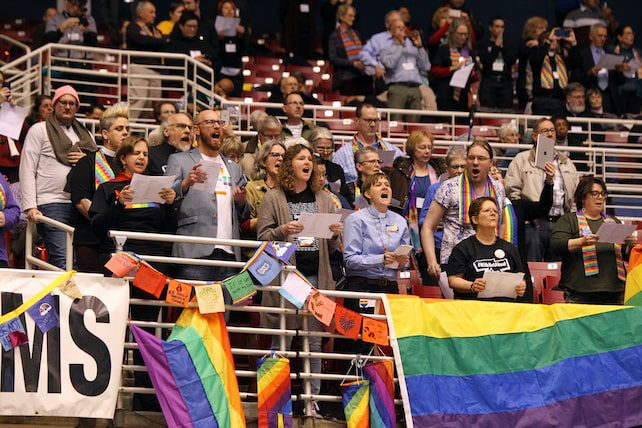The dividing conflict within the United Methodist Church — mainly the question of LGBTQ inclusion and affirmation — goes back to 1972, when the General Conference voted to add language to the denomination’s Book of Discipline declaring that “the practice of homosexuality is incompatible with Christian teaching.”
That language was revisited every four years at subsequent General Conference meetings until 2016, when delegates voted to hold a special session to finally settle the debate. At the 2019 special session, delegates narrowly voted to adopt what was known as the Traditional Plan, which upheld and strengthened language banning the ordination and marriage of LGBTQ United Methodists.
But the debate was hardly settled. Many LGBTQ United Methodists and their allies immediately vowed to resist and remain in the denomination.
Devastated by what he called the “poor witness” of the contentious special session, Bishop John Yambasu of Sierra Leone called a meeting of several bishops from outside the United States, as well as leaders from advocacy groups across traditionalist, centrist and progressive views.
In January 2020, that unofficial mediation group announced it had reached an agreement: The Protocol of Reconciliation & Grace Through Separation would allow traditionalist congregations and conferences to leave the United Methodist Church, taking with them their properties and $25 million to form a new Methodist denomination. The post-separation United Methodist Church would meet later to repeal language barring LGBTQ United Methodists from ordination and marriage.
Yambasu predicted “total disaster” if the protocol wasn’t approved at the 2020 General Conference.
But then, a deadly pandemic swept the globe, postponing the General Conference not once, but three times to 2024. Things started to come apart.
After the third postponement, some traditionalists, tired of waiting, announced they were launching the Global Methodist Church.
Earlier this month, four representatives of centrist and progressive advocacy groups and one clergyperson from the Philippines — all of whom had negotiated and signed the protocol — published a statement saying they “no longer in good faith” could support the plan or work toward its adoption by the General Conference.
The Protocol Response statement noted a lack of support from delegates, leaders outside the U.S. and members of the groups its signers represent.
“The overwhelming consensus among those with whom we spoke is that the once-promising Protocol Agreement no longer offers a viable path forward, particularly given the long delays, the changing circumstances within the United Methodist Church, and the formal launch of the Global Methodist Church in May of this year,” it reads.


